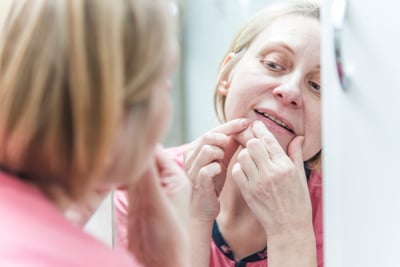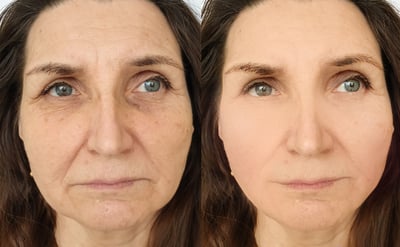
For most of the era of modern medicine, dermatology and psychology were treated as separate worlds. Skin conditions were managed on the surface, while emotional health was handled in the mind. But new research is revealing a powerful, two-way communication network between the skin and the brain known as the skin–brain axis that connects stress, mood, inflammation, and the skin microbiome in remarkable ways.
Understanding this relationship changes how we think about skincare and overall wellbeing. It suggests that the health of our skin and the balance of our emotions are deeply intertwined, paving the way for a new era of intelligent skincare that nurtures both appearance and mood.
The science behind the skin–brain axis
The skin and the brain share the same embryonic origin: Both develop from the ectoderm in a human embryo. This biological link helps explain why they remain so closely connected throughout life. The skin isn’t just a protective covering—it’s an active, complex sensory organ, densely connected to nerves, engaged in immune responses, and closely linked to the central nervous system. The brain communicates with the skin through hormones, neurotransmitters, and immune signals, while the skin can send feedback to the brain through nerve endings and inflammatory messengers.
When stress strikes, the brain releases corticotropin-releasing hormone (CRH) and cortisol, which can increase inflammation and oxidative stress in the skin. This explains why anxiety and chronic tension may make acne, eczema, and psoriasis worse, or leave even healthy skin looking tired and reactive.
The process works in reverse, too. Persistent inflammation or discomfort in the skin can heighten stress perception, creating a feedback loop that affects both physical health and emotional balance.
This two-way communication is at the heart of psychodermatology, an emerging field that explores how mental health and skin health influence one another and how addressing both can lead to better outcomes.
The importance of skin microbiome wellbeing
While most readers are familiar with the gut microbiome and the importance of healthy bacteria in the digestive tract, there has been less emphasis on nurturing the skin microbiome, though both areas have been shown to impact psychological health. The skin microbiome consists of the community of beneficial bacteria, fungi, and other microorganisms that live on the skin’s surface, and it plays a crucial role in the skin-brain axis. A balanced microbiome strengthens the skin barrier, regulates immune responses, and helps maintain a calm, resilient complexion.
Emerging research shows that healthy skin microbes produce compounds that influence neurotransmitters like serotonin and dopamine, the same brain chemicals tied to happiness and relaxation. While this connection is still being explored, it supports the idea that skincare and mood are more closely related than we once thought.
The skin microbiome is a key part of the skin barrier, which is the outermost layer of the skin that serves as a living interface between the body and the environment. A healthy microbiome helps the barrier keep irritants out, retain moisture, and maintain a balanced immune response.
When the microbiome is disrupted by harsh products, pollution, or prolonged stress, the barrier can weaken. This allows irritants to penetrate, triggers inflammation, and can lead to redness, irritation, and breakouts. In turn, barrier damage can further disrupt the microbiome, creating a cycle that affects both the skin’s appearance and its overall health.
Animal studies suggest that a weakened barrier can intensify the skin’s sensitivity to stress hormones. Clinically, people with barrier-related conditions like eczema often report flare-ups during emotional stress. Protecting the skin’s barrier helps calm inflammation and may even reduce the body’s stress load over time.
For both patients and providers, this means taking care of the skin barrier and microbiome aren’t just cosmetic pursuits. This type of skincare may also be essential for emotional and physiological stability.
Where science meets self-care: Skincare and mood
With this growing understanding of the skin–brain connection, the next step is figuring out how to support it in everyday life. While much psychodermatology research in this area is still emerging, experts agree on several best practices for supporting the skin, mind, and microbiome together:
1. Support the skin microbiome
Choose gentle, microbiome-friendly cleansers that preserve natural oils. Avoid harsh surfactants or overuse of antibacterial products. Look for prebiotic or postbiotic ingredients that nourish beneficial microbes and restore balance.
- Prebiotics to look for: natural plant fibers and sugars that feed good skin bacteria, like inulin (from chicory root), maltodextrin blends, or oligosaccharides from plants.
- Postbiotics to consider: ingredients made from the beneficial bacteria themselves, such as fermented extracts (like Lactobacillus ferment lysate) or peptides.
2. Protect and strengthen the skin barrier
Opt for gentle moisturizers with ceramides, fatty acids, and cholesterol that mimic the skin’s natural lipids. Avoid over-exfoliation and limit acids or retinoids when the skin feels sensitive. A strong barrier is essential for both visible skin health and overall skin microbiome well-being.
3. Manage psychological stress
No skincare routine can fully compensate for chronic stress. Practices like mindfulness, exercise, and quality sleep help regulate cortisol and reduce inflammation. Even brief relaxation techniques can influence the skin-brain axis, promoting clearer, calmer skin and a more balanced mood.
If stress or emotional issues become difficult to manage, patients should consider seeking professional help from a licensed mental health practitioner.
4. Opt for gentle clinical treatments
In-office skincare procedures that support the barrier and microbiome, such as light therapy or barrier-restoring facials, can help restore equilibrium to optimize skin health and its effects on mood. Dermatologists are increasingly favoring low-inflammation treatments, reserving more aggressive options until the skin’s resilience improves.
A note: While the science is promising, it’s still early in terms of large-scale clinical outcomes specifically tied to microbiome modulation via skincare, so treat these as supportive science-informed strategies, not guaranteed fixes.
What’s next in psychodermatology?
The growing field of psychodermatology is leading the way in integrating dermatologic and psychological care. Early findings point to exciting possibilities:
- Combined treatments that pair topical therapy with stress-management techniques may reduce flare-ups more effectively than either approach alone.
- Neurocosmetics, which are skincare products that influence nerve signaling to calm inflammation, are under active development.
- Probiotic skincare tailored to an individual’s microbiome profile may one day support both skin health and emotional wellbeing.
Though many of these approaches are still in research phases, they reflect a larger shift in medicine—one that treats the skin as a living, communicating organ connected to the body’s emotional ecosystem.
Dermatologists leading the way in skin-brain axis health
If stress seems to worsen your skin concerns or if a chronic skin condition affects your mood or confidence, it’s worth consulting a dermatologist familiar with psychodermatology. These clinicians can help identify emotional triggers and design holistic treatment plans that address both skin and mental wellness. Collaborative care involving dermatologists, psychologists, and primary care providers can be transformative for patients caught in the cycle of stress and skin flare-ups.
At Forefront, our team is excited and inspired by the latest discoveries in the skin–brain axis and is eager to bring these advances into personalized care plans that support both your skin and well-being. Find a Forefront location near you to learn more.





